John Dustin Archbold
John Dustin Archbold (July 26, 1848 in Leesburg, Ohio – December 6, 1916 in Tarrytown, New York) was an American businessman and one of the United States' earliest oil refiners. His small oil company was bought out by John D. Rockefeller's Standard Oil Company. Archbold rose rapidly at Standard Oil, handling many of the complex secret negotiations over the years. By 1882, he was Rockefeller's closest associate, and typically acted as the company's primary spokesman. Rockefeller, after 1896, left business matters to Archbold while he pursued his philanthropy; as vice president, Archbold effectively ran Standard Oil until his death in 1916. Inspired by Rockefeller's policies, Archbold's main goals were stabilization, efficiency, and minimizing waste in refining and distributing petroleum products. The company was broken up by the Supreme Court in 1911 into 34 smaller operations, Archbold became president of the largest one, Standard Oil of New Jersey.
John Dustin Archbold | |
|---|---|
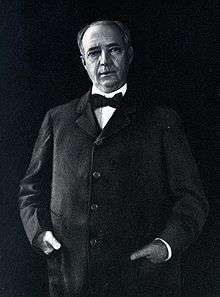 | |
| Born | July 26, 1848 Leesburg, OH, US |
| Died | December 6, 1916 (aged 77) Tarrytown, NY, US |
| Burial place | Sleepy Hollow Cemetery, Sleepy Hollow, NY |
| Occupation | Oil industry executive |
| Spouse(s) | Annie Eliza Mills |
| Parent(s) | Israel Archbold Frances Foster Archbold (nee Dana) |
Personal life
Archbold was born to Methodist minister Reverend Israel Archbold and Frances Foster Dana (Archbold) in Leesburg, Ohio. After being educated in public schools, he moved to Pennsylvania by 1864.[1]
On February 20, 1870, Archbold married Annie Eliza Mills, "daughter of Samuel Myers Mills of Titusville and Lavinia Jenkins."[2] The couple had four children:
- Mary Lavina Archbold (b 1871)
- Anne Mills Archbold (b 1873), mother of John Dana Archbold[3]
- Frances Dana Archbold (b 1875)
- John Foster Archbold (b 1877-1930),[1] father of zoologist Richard Archbold
In 1885, Archbold purchased a large mansion in Tarrytown, New York. The estate, called Cedar Cliff, was located at 279 S. Broadway just across from the Carmelite Transfiguration Church.[4]
Professional life
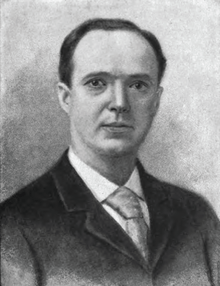
Standard Oil Company
In 1864, Archbold went to the north-west Pennsylvania oil fields and spent 11 years in the oil industry there. When John D. Rockefeller's Standard Oil Company began buying up refiners in this oil-rich region, many independent refiners felt squeezed out, and Archbold was among Standard's harshest and loudest critics. In 1885, after becoming skeptical of reports of oil discoveries in Oklahoma, he sold-out at a loss, saying "I'll drink every gallon produced west of the Mississippi!"[5]
Archbold was subsequently recruited by Rockefeller to Standard Oil, where he became a director and served as its vice-president and president until its dissolution in 1911. Between 1911 and 1916, Archbold was president of the Standard Oil Company of New Jersey.[6]
The Hepburn Committee
A. Barton Hepburn was directed by the New York State Legislature in 1879 to investigate the railroads' practice of giving rebates within the state. Merchants without ties to the oil industry had pressed for the hearings. Prior to the committee's investigation, few knew of the size of Standard Oil's control and influence on seemingly unaffiliated oil refineries and pipelines - Hawke (1980) cites that only a dozen or so within Standard Oil knew the extent of company operations. The committee counsel, Simon Sterne, questioned representatives from the Erie Railroad and the New York Central Railroad and discovered that at least half of their long-haul traffic granted rebates, and that much of this traffic came from Standard Oil. The committee then shifted focus to Standard Oil's operations. John Dustin Archbold, as president of Acme Oil Company, denied that Acme was associated with Standard Oil. He then admitted to being a director of Standard Oil. The committee's final report scolded the railroads for their rebate policies and cited Standard Oil as an example. This scolding was largely moot to Standard Oil's interests since long-distance oil pipelines were now their preferred method of transportation.[7]
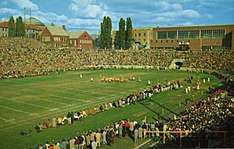
Syracuse University
In 1886, Archbold became a member of the board of trustees of Syracuse University, and was the board's president from 1893 until his death in 1916. From 1893 to 1914, he contributed nearly $6,000,000 for eight buildings, including the full cost of Archbold Stadium (opened 1907, demolished 1978; the Carrier Dome was built on this site), Sims Hall (men's dormitory, 1907), Archbold Gymnasium (1908, nearly destroyed by fire in 1947, but still in use), and the oval athletic field.
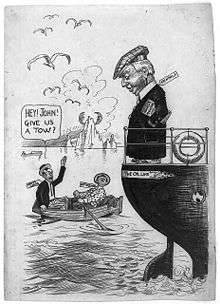
Theodore Roosevelt scandal
Archbold was involved in a scandalous affair involving monetary gifts to the Republican Party. In 1912, he was called to testify before a committee which was investigating political contributions made by the Standard Oil Company to the campaign funds of political parties. He claimed that President Theodore Roosevelt was aware of the $125,000 contribution made by Standard Oil Company to the 1904 campaign fund of the Republican Party, but President Roosevelt produced letters written by him which directed his campaign managers to return such monetary contributions if they were offered.
Assassination attempt
In 1915, an attempt was made by anarchists and Industrial Workers of the World radicals to assassinate Archbold at Cedar Cliff by planting a large dynamite bomb at the entrance to the estate.[8][9] The bomb, which failed to go off, was discovered by Archbold's gardener. Police suspected that the attempted bombing was precipitated by the execution by firing squad of 'Joe Hill', alias Joseph Hillstrom in Salt Lake City, Utah the day before. Joe Hill was an IWW member, songwriter and labor organizer who had been convicted of murder.[10]
Death
Archbold died of complications from appendicitis in Tarrytown, New York on December 6, 1916.[9][11] He is buried in Sleepy Hollow Cemetery in Sleepy Hollow, New York.
Legacy
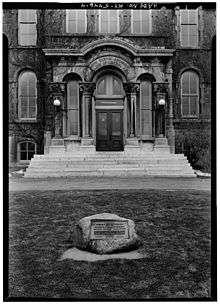
- In 1914, the "John Dustin Archbold College of Liberal Arts" at Syracuse University was renamed in his honor.[12] The entrance to the university's Hall of Languages remains inscribed with this name.
- The John D. Archbold Memorial Hospital, now the Archbold Medical Center, in Thomasville, Georgia, was established in 1925, through a donation by his son, John Foster Archbold.[13]
- His grandson, John Dana Archbold, was a member of the Board of Trustees of Syracuse University from 1976 to 1993.[3]
- The John Dana Archbold Theatre at Syracuse Stage (Central New York's only professional theater) is named after his grandson.[14]
- By the name of John Dustin Archbold named tanker (1914).[15]
See also
References
Notes
- The Archbold Collection, Edinboro University of Pennsylvania. Accessed: March 9, 2014.
- Dwight, Benjamin W. (1874). The History of the Descendents of John Dwight, of Dedham, Massachusetts, Vol. 2. J.F. Trow & Son, p. 662.
- John D. Archbold Papers, Clemson University. Accessed: March 9, 2014.
- Steiner, Henry, The Other Oil Tycoon, River Journal Online, retrieved 20 July 2011: Cedar Cliff was demolished in 1980, and is now a condominium development known as The Quay; the old stone pillars marking the entrance to the estate are still visible.
- "The Real History of the Standard Oil Company (Part IV: Pioneering in Big Business)". 1 September 2011.
- "Archbold, John D. (John Dustin), 1848-1916," Library of Congress Name Authority File. Accessed: March 9, 2014.
- Hawke, David Freeman (1980). John D. The Founding Father of the Rockefellers. Harper & Row. pp. 145–150. ISBN 978-0060118136.
- "DYNAMITE BOMB FOR J.D. ARCHBOLD; Four One-Pound Sticks Found Hidden in Roadway of His Tarrytown Estate. PERCUSSION CAPS ATTACHED. Explosive Was So Placed That Auto Wheel Would Have Fired It. POLICE SUSPECT THE I.W.W. Believe Attempt to Kill Standard Oil President Was Protest Against Hillstrom Execution". New York Times. November 22, 1915. Retrieved 2011-02-27.
- Steiner, Henry, The Other Oil Tycoon, River Journal Online, retrieved 20 July 2011
- DYNAMITE BOMB FOR J.D. ARCHBOLD, The New York Times, 22 November 1915
- "J. D. ARCHBOLD DIES; MOURNED BY MANY; Office Boys and Elevator Men Join in Regret with John D. Rockefeller. NEVER KNOWN TO BE ANGRY. Left Office Whistling Two Week Ago for Operation. Fortune Estimated at $100,000,000". New York Times. December 6, 1916. Retrieved 2011-02-27.
- Greene, John Robert. (2000). The Hill: An Illustrated Biography of Syracuse University, 1870-present. Syracuse University Press. Accessed: March 9, 2014.
- "Our History," Archived 2014-03-20 at the Wayback Machine Archbold Medical Center. Accessed: March 9, 2014.
- John Dana Archbold Theater Archived 2014-03-09 at the Wayback Machine, Syracuse University buildings. Accessed: March 9, 2014.
- "Tanker John D. Archbold - Ships hit by U-boats - German and Austrian U-boats of World War One - Kaiserliche Marine - uboat.net". uboat.net.
Further reading
- Chernow, Ron. Titan: The Life of John D. Rockefeller, Sr. London: Warner Books, 1998.
- Hawke, David Freeman (1980). John D. The Founding Father of the Rockefellers. Harper & Row. ISBN 978-0060118136.
- Hidy, Ralph W. and Muriel E. Hidy. Pioneering in Big Business: History of Standard Oil Company (New Jersey), 1882-1911 (1956).
- Moore, Austin Leigh. John D. Archbold and the early development of Standard Oil (Macmillan, 1930).
- Yergin, Daniel. The Prize: The Epic Quest for Oil, Money, and Power. New York: Simon & Schuster, 1991.
External links
| Wikimedia Commons has media related to John Dustin Archbold. |
- "Archbold, John Dustin," Cyclopaedia of American Biography, 1918, pp. 20–22
- Burton, Rick. (2011). "Archbold's Greatest Gift," Syracuse University Magazine 30(3)
- Archbold Biological Station, Venus, Florida
- Archbold Mausoleum, Mausoleums.com
- John D. Archbold Family Papers, Syracuse University
- The New York Times (1916, December 6). "J.D. Archbold Dies; Mourned by Many."
- Steiner, Henry. (2003, October 6). "The Other Oil Tycoon," River Journal, Tarrytown, New York
- John Dustin Archbold at Find a Grave